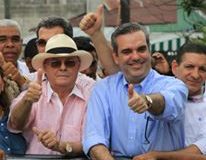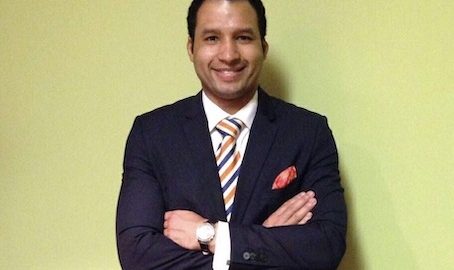U.S. Presidential Delegation to Reset Ties with Dominican Republic during Luis Abinader’s Inauguration Three Reasons to Watch the Dominican Republic
By Geovanny Vicente Romero.
On Sunday, when President-elect Luis Abinader is sworn in as 54th President of the Dominican Republic, U.S. Secretary of State Mike Pompeo will be celebrating in Santo Domingo with a high-level U.S. Presidential Delegation to reset U.S.-Dominican relations. Social media is abuzz with Dominicans imagining a toast or brindis of the famed Dominican Presidente beer between U.S. Secretary of State Mike Pompeo, who they affectionately call “Big Mike”, President Elect Luis Abinader and Foreign Minister Roberto Alvarez Gil, strolling through the historic streets of Santo Domingo, much like Pompeo’s recent beer diplomacy in Prague.
Timing couldn’t be better for both countries to embrace their strengths and forge a path toward greater prosperity for the Latin American and Caribbean. Dominican Republic is living a moment of euphoria right now. After 20 of the last 24 years have been dominated by a single political party, Dominicans recently elected new leadership amid a global pandemic. The Coronavirus, a tough economic year and rampant corruption have people optimistic about turning the page to a fresh government promising greater opportunities both at home and abroad.
Dominicans feel a greater sense of ownership over their democracy and appreciation for the United States, especially Secretary Pompeo, who issued a stern warning to current Dominican President Danilo Medina in 2019 about the importance of upholding the country’s election laws and institutions. A phone call that arguably changed the course of history in the Caribbean nation.
So, in mid-August, following a swing through Europe with COVID-19 travel considerations and a crucial election campaign back home, what could the U.S. Secretary of State and the highest-level bilateral delegation to the country since 2009 hope to achieve? A reset in U.S.-Dominican relations will likely focus on three key pillars.

1. Economy – The Dominican Republic is the fastest-growing economy in Latin America and the Caribbean since 2010, and largest economy in the Caribbean. With most of the country’s agricultural and mining exports destined for the United States, there are ample opportunities for nearshoring as a transshipment hub to diversify production and increase innovation. Greater U.S.-Dominican cooperation on regional port security and drug trafficking will incentivize investments in logistics. The Abinader government’ focus on transparency and rule of law will bring economic benefits to more Dominicans, helping to close the widening wealth inequality gap.
With its white-sand beaches and transparent waters, the Dominican Republic stands out as the capital of tourism and most visited island in the Caribbean. Tourism contributes nearly 10 percent of GDP, but with COVID-19, the industry will suffer. Longer term potential to bounce-back is high with people longing for vacations close to home, and DR offering unique experiences right for every budget. Thus, expect greater U.S.-Dominican coordination to facilitate safe travel for both American tourists and Dominicans in the diaspora.
2. Dominican Diaspora – There are 2.1 million Dominicans living in the United States with more than half born abroad, so strong linkages remain to the island with frequent travel back-and-forth and about $4-5 billion in remittances sent home each year. Talented and entrepreneurial, Dominicans in the United States are quick to set up their own businesses and reactivate blighted communities, especially in the northeast states. Dominican music and film stars like Romeo Santos and Zoe Saldana are wholeheartedly embraced by the American public. Many 2nd and 3rd generation Dominicans excel in professional fields such as law, medicine and education. Dominican voters in the United States, especially in swing-states like Florida and Pennsylvania are an important audience for Republicans in the November elections.
3. Baseball – No survey of U.S.-Dominican relations would be complete without an ode to the shared pastime of both nations, baseball. Dominicans comprise a record 110 Major League Baseball (MLB) players in 2020’s abbreviated season and are a major talent pool for the league. Nearly all MLB teams have baseball schools or talent scouts in Dominican Republic, which could provide a model for cultivating talent in other sports and educational fields. With high-profile COVID-19 cases among MLB players traveling from the Dominican Republic, bilateral health agreements can help keep both nations’ athletes healthy and safe. Dominicans and American tourists who seek medical treatment in both countries will also benefit.
Lastly, Dominican support for U.S. regional policies vis-à-vis Venezuela, and China’s influence in Latin America and the Caribbean will surely be topics of discussion. Look for the Dominican Republic to join a league of nations in the region such as Mexico, El Salvador, and Guatemala that are benefiting from stronger U.S. relations. Let’s remember that Latinos vote about 30 percent Republican, so Sec. Pompeo’s trip could also be part of a broader strategy to court more Latino voters in the November elections.
Regardless of who is in the White House come January, U.S.-Dominican relations have a bright future building on economic, people-to-people ties, and regional cooperation.
About the author:

Geovanny Vicente Romero is a columnist for CNN and Infobae based in Washington, DC. He is a political strategist, international consultant and lecturer. He’s published many articles on development, human rights, governance, democracy, elections, the environment, as well as the role of women in a society. He is the founder of the Dominican Republic Center of Public Policy, Leadership and Development (CPDL-RD). Geovanny has a masters degree from The George Washington University in political communications and strategic governance. Reach him on Twitter @GeovannyVicentR.



